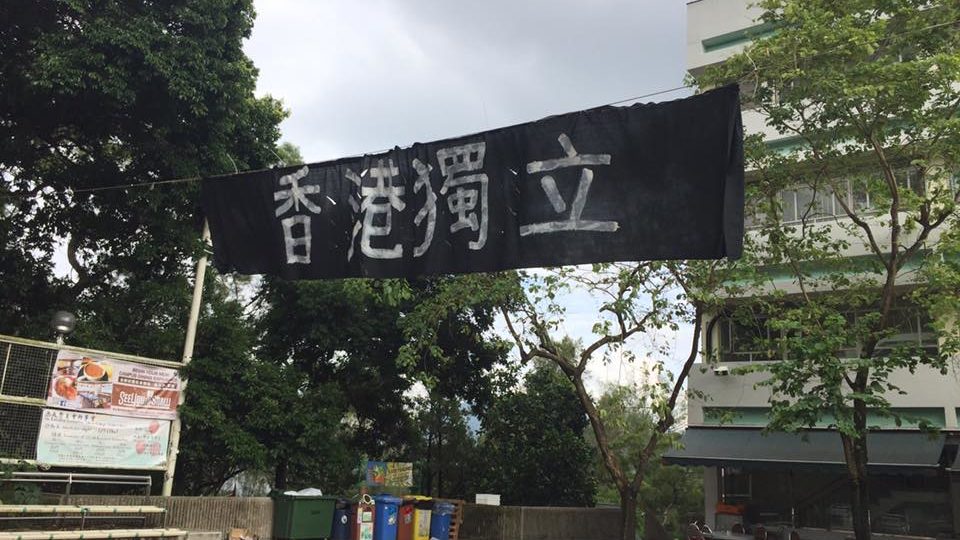Pro-independence banners and posters continued popping up around Hong Kong universities this week as students from at least six institutions joined in solidarity with students of the Chinese University, where the signs first began appearing on Monday, a situation that escalated to the point of a near brawl yesterday.
The most recent institution to join the growing row was the University of Science and Technology, according to Oriental Daily, where similar banners and posters advocating Hong Kong independence surfaced on the “democracy wall” of its campus yesterday.
The “democracy wall” is a notice board on every university campus for students to display their opinions and ideas freely.
The Education University, University of Hong Kong, Polytechnic University, City University and Shue Yan University round out the group of seven local universities where students this week have openly called for Hong Kong’s separation from China.
While several student unions were quick to claim responsibility for placing the banners, some were put up anonymously.
Disputes between students and their schools stirred up quickly after campus security personnel moved to take down the banners, which the institutions branded “unauthorized” or “illegal”, according to EJ Insight. Student leaders, on the other hand, have criticized their school administrations for what they term “a clampdown on freedom of speech”.
The controversy has also drawn backlash from pro-Beijing groups. Some 200 people from both pro- and anti-independence groups marched to the Chinese University campus yesterday afternoon, resulting in a chaotic scene of pushing and shouting that lasted for about 30 minutes before all were eventually dispersed by campus guards.
The conflict came just a day after the university’s student union threatened to seek a judicial review over the administration’s handling of the matter.
One the same day, student unions from City University, post-secondary Hang Seng Management College, Lingnan University, Polytechnic University, Education University, Open University and Chinese University, issued a joint open letter defending the campaign.
“Freedom of speech and thought is a God-given human right. People may disagree with views on independence, but [anyone] should enjoy the right to talk about it,” the letter said. “The suppression of such ideas by the school not only deprives students of political rights, but is a humiliation to academic freedom,” it added.
Education University’s student union president Lala Lai, meanwhile, told the SCMP that the union supported the discussion of different ways forward for Hong Kong. “But we have now demonstrated that the school will engage in political screening [of publicity materials], hurting our autonomy and freedom of expression,” she added.
Barrister and Executive Councillor Ronny Tong said yesterday that putting up signs calling for independence violated the Crimes Ordinance’s Article 9 which stated “seditious intent” to bring hatred or contempt or to excite disaffection against “the person of Her Majesty, or her heirs or successors,” or against the Hong Kong government could face a jail term of up to two years if convicted.
Tong’s references to “Her Majesty, as reported by EJ Insight, refer to still-existing passages in Hong Kong’s Common Law, which in practicality now refer to the central government following the city’s handover from Great Britain to China in 1997.
However, Civic Party leader Alan Leong, who is also a barrister, told the paper the law was “so old and full of colonial intent” that it was not applicable in modern-day context. If the Chinese government used the law to go after the students, Leong said, “it would mean that China is ruling Hong Kong like a colonial place.”
Apostle Lau, head of Shue Yan University’s student union, said union leaders will hold a meeting in coming days to coordinate their actions.




